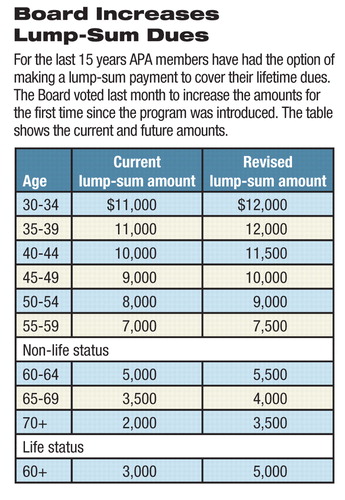Fiscal Issues Prominent at July Board Meeting
APA's finances were in the spotlight at the July meeting of the Board of Trustees in Chicago. At this early point in the year, APA is facing a potential year-end deficit of approximately $452,000, after many years of budget surpluses.
As pointed out by Secretary-Treasurer David Fassler, M.D., and Finance and Budget Committee Chair Jack Bonner, M.D., this year's budget projections may not be met in large part because of a major drop in pharmaceutical advertising in APA publications and higher than expected costs and lower than expected income from the annual meeting—these are among the major sources of income for APA. APA Medical Director James H. Scully Jr., M.D., said that there are contingency plans in place if such a deficit does exist at the end of the year.
Bonner introduced four finance-related items developed by his committee, all of which the Board passed.
The first of these actions was an increase in the rates for lump-sum dues payments, an option by which members make one payment and are then exempt from paying future dues to APA. The lump-sum amount has not changed in 15 years. About 155 members have taken advantage of the program. The rates vary by age (see table).

The second proposal the Board approved is to implement small increases in member and nonmember annual meeting course fees. Advance course registration fees will increase by $14 or $15.
In addition, the Board voted to increase registration fees for the 2009 annual meeting in San Francisco. For members, the fee will increase by $10 to $280 for advance and by $5 to $350 for on-site registration. Member-in-training registration fees will increase by $5 for both advance and on-site registration to $80 and $90, respectively. Nonmember fees were also increased.
Finally, the Board voted to increase block grants to district branches and state associations from the Board New Initiative Fund.
On a recommendation from the Membership Committee, the Board increased annual dues for Canadian members from $300 to $330. Canadians have for several years paid lower dues than U.S. members, because they benefit from fewer of the services APA provides, particularly advocacy on legislative and regulatory issues. In addition, the Canadian dollar has traditionally been worth less than the U.S. dollar, but with the latter's steady loss of value over the last few years, the two currencies are now at par.
In other actions the Board voted to
appoint a work group to review APA grants to district branches (DBs) and state associations that are used to support advocacy and infrastructure improvements. Among factors to be reviewed are DB size, DB dues revenues and other member assessments, frequency with which DBs request APA grants, and how best to distinguish between advocacy and infrastructure grants. | |||||
add primary care initiatives to the list of priority topics for which competitive grants can be awarded to DBs. These grants are administered by the Council on Member and District Branch Relations. | |||||
approve an updated edition of the Practice Guideline for the Treatment of Patients With Panic Disorder,which is scheduled to appear in the January 2009 issue of the American Journal of Psychiatry. | |||||
increase the duration of member-in-training status from six to nine years. This reflects the fact that some residents now take consecutive fellowships in subspecialties or complete them part time. | |||||
endorse the Psychosomatic Medicine Core Competencies Outline of the American Board of Psychiatry and Neurology. The competencies are divided into six topics: application of knowledge in the clinical setting, the fund of knowledge including conceptual theory and scientific literature, interpersonal and communication skills, ability to apply daily clinical practice to one's own learning, professionalism, and systems-based practice. | |||||
In addition, the Trustees heard from several speakers. Sue Bergeron, CEO of the Depression and Bipolar Support Alliance (DBSA), emphasized the consumerled group's broad scope, with more than 1,000 groups in all 50 states. She noted that the group distributes more than 1 million brochures a year, all written in a “patient-friendly” style. The DBSA also offers several“ scientifically based recovery tools,” she pointed out. About 99 percent of what the group produces is free, since many of its members are on disability or can't afford to buy them, she noted.
Trustees also heard updates on activities in two DBs. Lisa Rone, M.D., president-elect of the Illinois Psychiatric Society, discussed the DB's successful advocacy efforts to convince state lawmakers to expand parity-law mandates to include anorexia and bulimia in the category of serious mental illnesses that insurance plans have to cover.
Kelda Walsh, M.D., president of the Indiana Psychiatric Society, discussed tort reform in the context of the state's Patient Care Fund, which was established in 1975 after huge increases in malpractice premiums. All physicians pay into the fund, thus keeping malpractice rates relatively low. Psychiatrists pay the lowest amount among medical specialists, she pointed out. She also noted that the DB has increased its focus on CME programs, rotating them among different regions of the state. In addition, she cited the problem of Indiana physicians dropping out of Medicaid after reforms to the program, including more prior-authorization requirements. The shrinkage of the number of participating physicians is causing an access crisis, Walsh said.
Actions taken by the Board at its July meeting are posted in the Members Corner of APA's Web site at<www.psych.org>.▪



